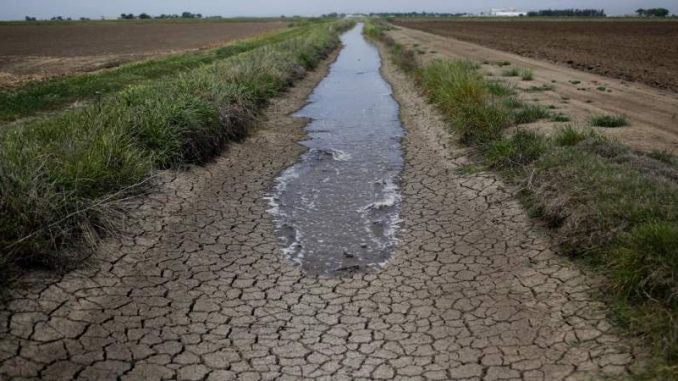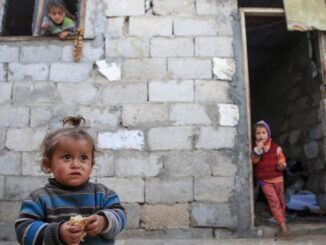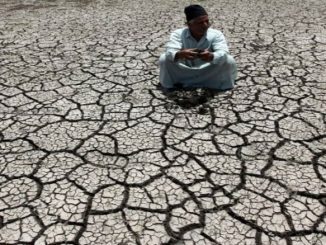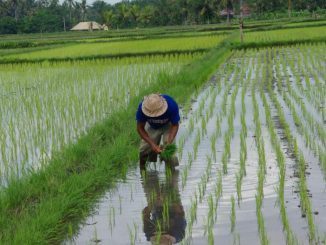
The European Parliament released a report titled:” A stable Egypt for a stable region: Socio-economic challenges and prospects “about the challenges that are facing Egypt and their impact on the country’s socio-economic and political stability in the next two decades. Among the most critical challenges facing the North African country are both the pressure on water resources and the climate change that would hit the country with disastrous water and food crisis.
A Decline in Egypt’s Water Resources
Egypt’s water supply is limited and is projected to come under ever-greater stress due to a number of factors. “First, population increases will mean less available fresh water per capita. Second, inefficient use of water for agricultural production, especially by small farms with inadequate infrastructure in smaller plots, creates more instances of water waste. Third, an increased production of sewage and untreated industrial waste will lead to a continued deterioration in water quality. Fourth, higher temperatures and lower rainfall anticipated as effects of climate change will require increased agricultural irrigation,” according to the report.
All of these factors will contribute to greater costs for the state and a larger burden on the economy as a result of necessary infrastructure upgrades for agricultural and water delivery systems.
“In addition, the Ethiopian Renaissance Dam — currently under construction — will have an impact on available water supplies flowing into Egypt. Egypt’s current share of water from the Nile River is approximately 55.5 billion m3, which is predominantly used for agriculture (approximately 85.6 %),” said the report.
While there are no conclusive studies on the exact impact of the dam on Egypt’s water supplies, some estimates show that water supply may decline by 25 %.
The reports stated, “This will have an impact on electricity production from the Aswan High Dam and on Egypt’s overall agricultural production and food security.”
Decreased water supplies from the Nile will have an impact on cultivatable land and will lead to the end of many of the land reclamation projects that the government is currently undertaking.
In fact, Egypt’s parliament started to take precautions to face the deficit in the water supply as concerns increase over the Grand Ethiopian Renaissance Dam.
On April 21, the Parliament of Egypt passed legislation banning cultivation of crops that require high volumes of water like rice, bananas and other crops. The violators will prison time and fines of up to $3,000.
According to the report, “Should the effects of the dam not be mitigated and negotiations between Egypt and Ethiopia break down, there is a potential for conflict between the two nations in the next 10 years.”
Earlier this month a round of talks between Egypt, Ethiopia, and Sudan held in Khartoum, resulted in an impasse, with failure to reach agreement on issues regarding sharing of water resources.
Climate Change and Food crisis
The report also highlighted the effect of the climate change on Egypt in the next five decades. It stated that the effects will likely include higher temperatures, changes in rain patterns, higher sea levels and potential increases in catastrophic weather events, which create significant threats to communities and the agricultural sector of Egypt’s coastal areas, the Nile Delta is the region most critically threatened by rising sea levels, as it is only about 1 meter above current sea levels.
“The northern third of the delta is sinking at a rate of about 4 to 8 mm per year due to compaction of strata underlying the plain, seismic motion, and the lack of sufficient new sediment to re-nourish the lands being currently eroded by Mediterranean coastal currents, “according to the report.
The report highlighted the predicted that the inundation of the Nile Delta by rising sea levels by 2060 should no protective measures be undertaken.
The Nile Delta is the most fertile area in Egypt and a major source of its food production.
The UNDP projects that the inundation of the Nile Delta and subsequent decrease in agricultural production will have a dual negative impact, first on food supplies and secondarily on employment in the agricultural sector. Lower food production would have implications for both the health and well-being of communities (malnutrition)and in turn, become a catalyst for poverty and social unrest.
“Should flooding occur in the Nile Delta, entire communities could be displaced, with extensive loss of property, “said the report.
In a recent study, CAPMAS projections show that Egypt will face a decline in the productivity of key agricultural crops over the next 10 years due to climate change.
The study is based on modelling done between 2014/15 and 2024/25 and assumes temperature increases of 1-2 degrees Celsius. The decline in wheat production is particularly alarming, as it is a key staple that has direct ramifications for social stability, as bread is a key food source for millions of Egyptians.
“By some estimates, Egypt is already the largest importer of wheat in the world. While the government has plans to increase its wheat production, CAPMAS data predicts that climate change will become a major obstacle towards that goal.”
In addition to the adverse effects of terrorism on the tourism industry, in the long-term climate change poses an even greater threat to the tourism industry. Already, research focusing on Egypt’s economic vulnerability to climate change shows a negative impact on tourism revenues by 2030.
The report said, “As tourism revenues decrease, the job market and the economy will suffer. The symptoms of climate change also threaten many historical and natural treasures. Rising sea levels could threaten antiquities and the many popular beaches along the Mediterranean and Egypt’s Red Sea coast. Pristine beaches along the coast will be inundated and shorelines submerged if sea levels continue to rise.”
Rising temperatures will adversely affect coral reefs, which attract divers and snorkelers from across the globe, representing a major contribution to the Egyptian tourism industry.
The Red Sea is considered one of the most bio-diverse reefs in the world, and while the Egyptian Red Sea has not shown significant signs of coral bleaching thus far, there have been two bleaching events along the Saudi Arabian coastline in the last decade due to high levels of pollution.
Finally, rising temperatures across the country will make Egypt a less attractive tourist destination. The effects of climate change on tourism are already visible in tourist destinations like Alexandria on the Mediterranean coast.



